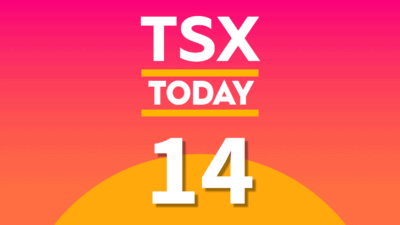The prospect of a recession is on everybody’s minds these days. Meltdowns in the cryptocurrency market, rising interest rates, Fed quantitative tightening, rampant inflation in the form of soaring gas and food prices, and mass tech sector layoffs have offered an ominous look into an increasingly bleak economic forecast.
The formal definition of a recession (a fall in GDP in two successive quarters) has not yet been met, though. Some sectors are still chugging along fine, like energy. Other more defensive ones that produce or provide essential products or services (like consumer staples or healthcare) might be poised to outperform if a recession hits.
Instead of picking your own healthcare and consumer staple stocks, a great way to own a diversified basket is by buying a sector exchange-traded fund (ETF). Let’s take a look at my top two picks today.
Consumer staples ETF
BMO Global Consumer Staples Hedged to CAD Index ETF (TSX:STPL) tracks the FTSE Developed ex Korea Consumer Staples Capped 100% Hedged to CAD Index, net of expenses. This ETF is a great way to get easy exposure to a portfolio of global consumer staple stocks.
This index holds 156 large- and mid-cap stocks in the consumer staples sector, with each stock not exceeding 10% of the ETF. Notable companies include Proctor & Gamble, Nestle, Coca-Cola, PepsiCo, and Unilever among many other blue-chip names.
The ETF is currency hedged to minimize the volatility from fluctuations in the USD-CAD pair. Holding STPL will cost a MER of 0.40% per year currently pays a decent annualized distribution yield of 2.31%.
Healthcare ETF
Harvest Healthcare Leaders Income ETF (TSX:HHL) offers exposure to 20 large capitalization global healthcare stocks with a covered call overlay. The covered call overlay enhances income by writing options against the portfolios holdings, allowing for a high monthly distribution.
The healthcare industry is already highly defensive, and, coupled with the covered call strategy (which performs well in sideways trading, high-volatility environments), that makes ETFs like HHL a potentially good buy-and-hold pick for income-oriented investors.
HHL currently yields a huge 8.76% but costs an expensive MER of 0.85%. Top holdings in the ETF include global healthcare companies like Merck & Co., Pfizer, and Amgen.
The Foolish takeaway
Investing during a recession doesn’t just mean holding cash and waiting to time the market (it almost never works out). An allocation to low-beta, defensive sectors such as healthcare and consumer staples may be a good option for staying invested. Using ETFs instead of picking individual stocks provides built-in diversification and capital efficiency for investors looking to take a hands-off approach with their portfolios.
 Stock Up Sale
Stock Up Sale








